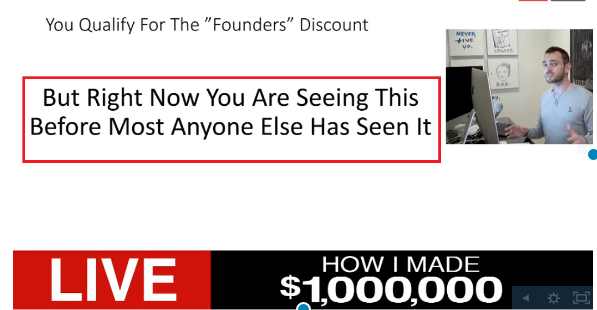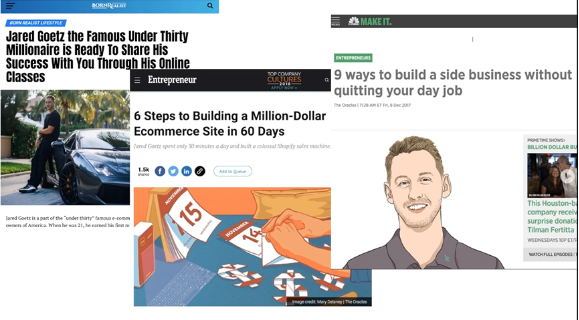5 Jason Capital Marketing & Persuasion Techniques Explained
Would you like to know Jason Capital’s sales and marketing secrets that have made him extremely successful?
In this case study, I’m going to explain the most powerful marketing psychology and persuasion techniques used by Jason Capital.
He has used these techniques to build a loyal following, sell courses and influence people. And if you understand these techniques and how to apply them, you can use them in your own life and business to make more money and influence more people.
In this article you will learn…
- The one word Jason uses to create massive curiosity
- A powerful technique copied from marketing legend Dan Kennedy
- An NLP technique commonly used by Jason and other marketing gurus
- How he makes a $2495 course seem like a bargain
Who Is Jason Capital?
Jason Capital is an American entrepreneur. He built his following through social media, with over 155k YouTube subscribers and over 1 million Instagram followers.
Jason originally became known in the men’s dating space but has now transitioned into entrepreneurship content. His target market is almost exclusively younger men, aged between 16-27.
Capital’s net worth is estimated to be $2 million according to several sources.
I have not followed Jason extensively and I haven’t purchased any of his courses. I did watch some of his YouTube videos and it seems like he does offer some sound advice for his target market.
But I have closely studied his sales and marketing materials. His marketing is very persuasive and compelling. And he may be one of the best in the world at using status to influence his audience.
Some of his marketing techniques could be deemed manipulative and unethical. Much like most other marketing gurus. But he does at least provide some quality content.
#1. Exclusivity & Curiosity
At the time of writing, Social Media Boss is the main course Jason Capital is promoting through his Instagram account
I found the course by clicking the link in his Instagram bio. The link took me to a landing page for his free e-book F*ck Jobs – Just Get Rich Now.
After submitting my email address, I received this message on Facebook Messenger:
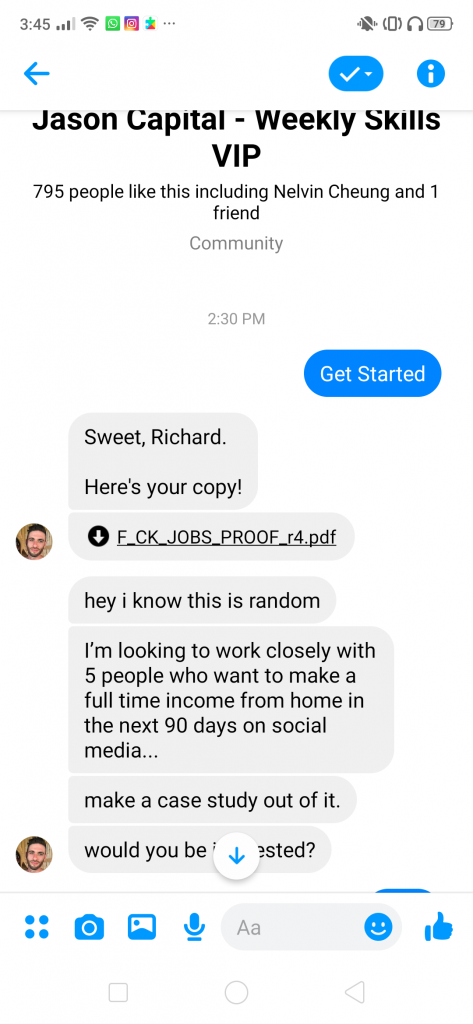
This was a direct message from Jason Capital’s Facebook page asking me if I’d want to be one of 5 people to work with him and make a case study.
That sounded very similar to a message I’d seen just a few minutes earlier when researching Jason Capital on Reddit..

It’s just an automated message from a bot. But many people won’t realize. As we can see from the Reddit post above.
There are over 1.3 billion active users on Facebook Messenger in 2020. The ability to create automated and 1:1 marketing messages, makes it one of the best platforms to include in your marketing strategy for many businesses.
You can set up your own automated messages and chatbots like Jason is using with a tool like Mobile Monkey.
The message serves two purposes. Firstly it creates a feeling of exclusivity.
Assuming they don’t realize it’s an automated message, the recipient is going to feel special because Jason is offering them this exclusive opportunity.
People value exclusivity because owning or being part of something exclusive makes them feel superior to others.
Take a look at this sales letter from American Express. It was credited with generating over $1 billion in new business for American Express during the 1970’s and ’80’s.

Notice how they position the American Express Card as a highly exclusive club to be part of? People are always subconsciously looking for evidence that they are superior to others and American Express gives it to them.
You can read the full American Express sales letter here.
A perception of exclusivity is also effective because people have been conditioned to associate exclusivity with high value. When a product or service is positioned as being exclusive, people will subconsciously perceive it as high value.
As well as creating a sense of exclusivity, Jason’s Messenger message also generates curiosity. At the very least, you’re probably going to be curious to learn how you can make a full-time income from home in the next 90 days.
This is an example of an open loop…
He opens the loop by telling you about this opportunity to make a full time income in 90 days. But until you find out how, the loop will remain open.
So obviously when Jason asks if you’re interested, you will reply ‘yes‘ to find out how you can make a full-time income from home.
Notice how Jason also uses open loops to persuade people to click on his YouTube videos too…
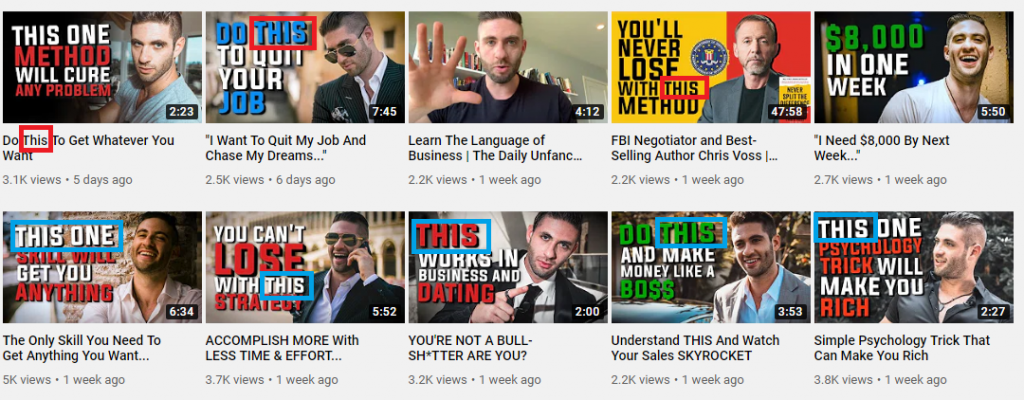
I have highlighted the word “this” in the videos above because that one word sets up the open loop.
People want to know what this is.
They want to know “this one skill that will get you anything,” and “this one psychology trick that will make you rich.”
#2. Jumping Through Hoops
After I told Jason’s Messenger bot that I was interested in making a full time income from home in 90 days, I received this message..
He wanted me to jump through a few hoops first before giving me the chance to buy.
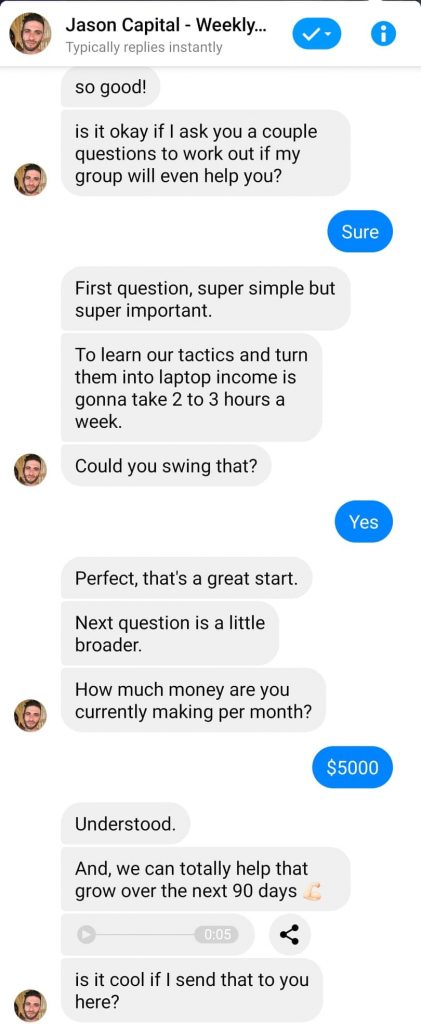
To be honest, I think this was a little poorly executed. He could have asked better questions to have a greater impact. But the lesson still applies.
In his book, No BS Sales Success in The New Economy, marketing expert Dan Kennedy explains why you should make prospects jump through hoops like this.
He says you firstly want to make it easy for people to enter your sales funnel and identify as a prospect.
But then you want to make them earn the opportunity to become your customer.
By making the prospect jump through hoops, it puts you in a position of power. The prospect now feels like they have to win you over.
And if you accept them as your customer, they’re going to feel privileged and special to be offered the opportunity. It helps to amplify the sense of exclusivity.
Unlike most online courses, Jason does not have a sales page for the Social Media Boss Course. And he does not directly advertise it. But he does tease out just enough to pique curiosity and bring people into his funnel. You can see how he does this in his Instagram Stories…
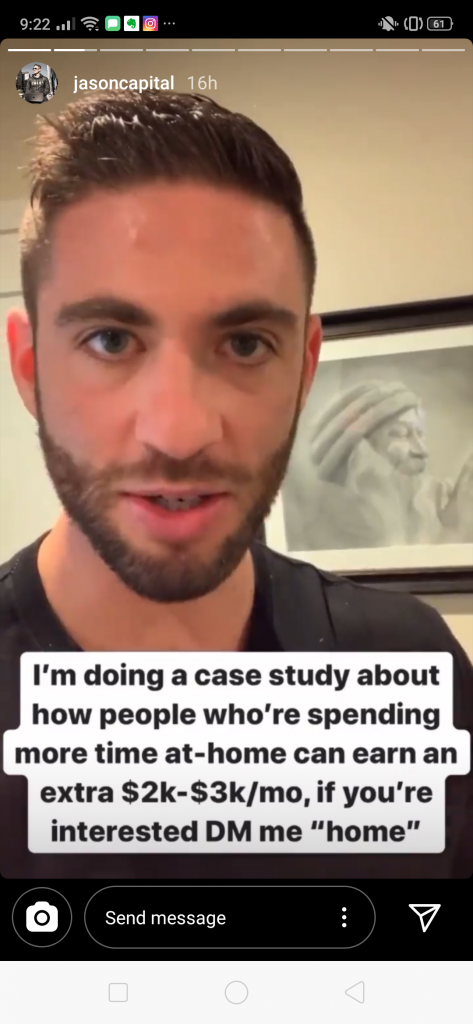
This is another hoop for his audience to jump through. And it simultaneously increases the sense of exclusivity.
When someone sends Jason a DM, they have already made a small commitment. This is going to make them more receptive to what comes next in Jason’s funnel.
After jumping through Jason’s hoops in the Messenger chat, he sent me a link to this 7 minute YouTube video. The video is basically a miniature webinar, with Jason explaining why you should join Social Media Boss.
What I liked, was the very personal feel to the video. Jason does an excellent job of making the viewer feel like he is speaking directly to them.
At the end of the video, Jason asks the viewer to jump through one more hoop and message him if they’re interested.
I think Jason made a mistake by hosting this video on YouTube. Firstly, the prospect is going to feel a bit less special when they see the view count and realize this has been sent to over 6000 other people.
He should have hosted the video on Wistia or another platform where view count isn’t visible.
And being on YouTube diminishes the perceived value of the course. Although YouTube is a fantastic platform, people will subconsciously associate it with free and low value.
#3. Future Pacing
Future pacing is a NLP technique used by many of the world’s best copywriters.
It’s one of the key persuasion techniques used by Jason Capital to sell his email income course.
Future pacing involves getting your prospect to imagine how good life will be when they use your product. On his sales page for Email Income, Jason uses future pacing right from the start.

See in the highlighted examples how he is getting the reader to imagine how life will be when they develop the skill taught in his course?
He knows his audience well and understands their greatest desires. So he begins to build a future vision around those desires.
Jason knows his audience is mostly young guys. They desire power, status, wealth and women.

So Jason gets them to imagine a future where they have all of these things. And he positions his email income course as the fastest path to the future life they want.
By promising his audience that this is the fastest path, he engages people’s desire for immediate gratification and ease. This is a powerful technique that I discuss at length in other articles.
#4. High Status Perception
In my post on marketing psychology, I discuss the importance of positioning yourself as an authority. Especially if you’re selling information.
If your audience perceives you as an authority, they are far more likely to trust you and buy from you. This is known as the authority bias.
Some coaches and gurus position themselves as an authority by associating themselves with celebrities or respected organizations. In another post, I explain how business coach, JT Foxx uses authority by association to sell over $250,000 at his free seminars.
Most people in the information industry will use social proof to increase their perception of authority. This is most commonly done by providing testimonials in their sales materials.
You can see on Jason’s Email Income sales page that he leverages social proof through video testimonials..

But Jason’s greatest strength is his ability to create a perception of high status.
Everything from the way he speaks, his body language and his clothing all signals to the viewer that Jason Capital is a high-status guy.
This perception of high-status is what gives Jason Capital credibility in the eyes of his audience.
Watch this short video from Jason’s YouTube channel and observe his sub-communications.
Firstly, you will notice his eye contact. When he speaks, he looks directly into the camera. He doesn’t break eye contact.
Observe his body language. See how he uses his hands and moves his body? This shows that he’s not afraid to draw attention to himself.
Listen to his voice. He speaks will complete confidence and conviction.
The words he uses in this video don’t even matter much. He communicates far more to the viewer through these sub-communications.
Even if you didn’t speak English, you would watch this video and perceive him as a high-status guy.

Jason further builds on this perception of himself as high status by showing images of him with attractive women, expensive cars and speaking in front of audiences.
He uses his Instagram page to routinely showcase his lifestyle and status.
These displays of wealth and lifestyle serve a dual purpose.
Firstly it builds his perception of high-status. But it also hits the viewer on an emotional level.
It reminds the viewer of what they don’t have. And that creates some emotional pain for the viewer.
Jason is selling status to his audience – one of the most powerful motivators in advertising.

Then Jason presents his product as a way to resolve this pain. His program is the solution to get what they don’t have right now.
#5. Price Anchoring
Price anchoring is by no means a strategy that is unique to Jason Capital. Almost everyone who sells an online course does it. But what is the psychology behind it?
In his book Predictably Irrational, Dan Ariely explains the anchoring effect. An anchor price basically serves as a reference point.
Imagine if you went into a shoe store and found a new pair of shoes. You look at the price tag and the shoes are selling for $350.
That price becomes your reference point.
The next day, you’re in a different store and see the same pair of shoes on sale. This time they’re selling for $240.
You now view this price relative to your reference price of $350. In contrast to $350, a price of $240 appears to be a bargain. You’re far more likely to buy the shoes now as your perception of value has been altered by the reference point.
That’s how price anchoring works. This technique is extremely powerful in marketing. Marketing gurus like Jason Capital use the technique to make their overpriced courses appear to be great value.
On his Email Income sales page, Jason sets his anchor price at $42,000..

In the webinar, he breaks down each component of the course showing how it all adds up to this $42,000 price tag.
The anchor has now been set. Viewers or readers will view the real price in relation to this anchor price of $42,000.
Gurus will try to tell you that even at this anchor price, the course is still a great investment.
But then they introduce the special price that’s only available today. This creates a sense of urgency – a concept I talk about in further depth in my article on John Crestani.
Jason’s ‘today only‘ price is just $2495 or three payments of $995.

After Jason had set his anchor price at $42,000, a single payment of $2495 feels very reasonable by contrast.
If he were to introduce the $2495 price tag without firstly creating a point of reference, most people would deem it overpriced.
Summary – How You Can Apply This
This is just five of the techniques used by Jason Capital in his marketing.
Jason’s understanding of consumer psychology allows him to create very persuasive marketing materials.
But this isn’t about Jason Capital. It’s about the lessons you can take away from his marketing and apply in your own business.
You don’t need to pay $2495 to learn his marketing secrets. You can learn those secrets for free just by carefully studying the principles I discussed in this post.
Think about how you can generate curiosity in your marketing. Consider how you can position yourself and your brand as high-status. And examine how you can use price anchoring in your pricing strategy.
If you’re interested in learning more about marketing psychology and consumer behavior, take a look at some of my other posts below.
Marketing Psychology Principles Explained With Real Examples
Alex Becker Webinar Psychology Breakdown
John Crestani Marketing and Persuasion Techniques Revealed
Russell Brunson $3.2 Million Presentation: The Influence Psychology


